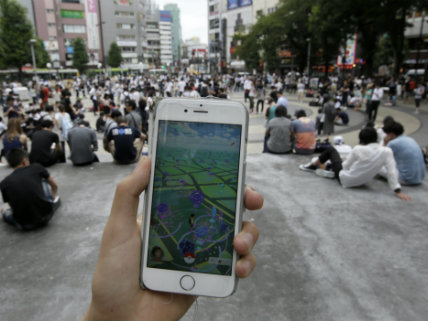Is Pokemon Go the Most Libertarian Game Ever Made?
Credit Pokemon Go's success to its lack of rules and regulations.

Across the street from my apartment in St. Paul, Minnesota, is a small city park, one block long by one block wide.
At night, it's usually pretty empty. There's a handful of homeless people who sleep there in the summer and the occasional group of twenty-somethings crossing from the bars on the north side of the park to the bars on the south side.
At least that's how it used to be, before Pokemon Go came along.
Now there's crowds of people in the park every evening, staring at their phones, wandering around and hoping to catch a Pikachu or an Eevee. Believe it or not, they even talk to each other.
Ernie Smith, a writer at Tedium, has seen the same thing happening in other places, and he sees (or maybe doesn't see) the invisible hand at work.
"It looks spontaneous from a distance—totally unplanned, as if they all stumbled there independently," Smith writes.
That's not exactly true, of course. Those people, and thousands of others like them, have been lured out of their homes and apartments by the game—which is, almost by definition, planned.
But, Smith says, the whole thing got him "thinking a bit about the nature of spontaneity, the cosmic way that we do things on the fly, and the way those things connect together."
Libertarians know all about that sort of thing. Spontaneous order, the idea that human beings when left to their own devices tend to figure out the best way to organize and run their personal worlds (and social structures) without having to be told what to do, has been a basic tenet of libertarian thought for decades.
Does that make Pokemon Go the most libertarian game ever made?
It might be. People freely chose the play the game and, in the course of playing it, they freely choose to associate with other people. You can play Pokemon Go alone in your bedroom, but you won't be very successful. The game, like society at large, requires an individual player to seek out co-operation and competition in order to prosper. Those social engagements aren't happening because the government (or even Prof. Oak) forced them to happen—they just do, freely.
Aside from the part that built on 90s nostalgia, much of the app's success can be attributed to its lack of rules and regulations. Yes, the game makes you physically move around in order to catch and level-up Pokemon, but otherwise it lets the players decide when, where and how the action happens. There's no Pokemon government telling you to go to the gym once a week, limiting how many Pidgeys you can catch or how long you are allowed to keep those cute little monsters cooped up inside those tiny Pokeballs (although PETA is actually worried about that, believe it or not).
The same sort of spontaneous order has long been an important element in online roleplaying games, like the successful Warcraft series, which sets up basic rules for how the fictional world of the game works and then lets players work together or separately to do pretty much whatever they want.
The difference, though, is that Pokemon Go takes that premise out of the basement and into the real world.
It's a nearly seamless transition because so much of the world is already subject to spontaneous order.
"With Pokémon Go, a beautiful emergent order of community has already started," writes Tyler Groenendal, a blogger for the Acton Institute. "The game provides the opportunity for building social institutions, but it's the actions of the individuals in the game that build it, forming a beautiful spontaneous order 'of human action, not human design.'"
While there has been much hand-wringing over the way modern technology can divide and isolate people, Groenendal says, it really comes down to how that technology is used. Sure, Millennials might be hiding behind their cell phones all day, but those cell phones allow anyone living today to access an entire world of information and social interaction that would have been unfathomable 25 years ago.
Pokemon Go is capturing more than the typical video game crowd. It now has more users than Tinder—making a case that it might be more powerful than one of humanity's most basic urges—and would-be Poke-masters cut across social, political and demographic lines.
"But with a design like Pokémon Go, there are no wallflowers, because everyone is brought together by a shared experience, one that appears on its own without any additional contrived strategies on the part of the creators of the game," concludes Smith.
The limitlessness of Pokemon Go's world is only possible because of how the game allows its players to order their own world.
That idea works in the real world too, whether players look up from their phones long enough to notice or not.


Show Comments (72)